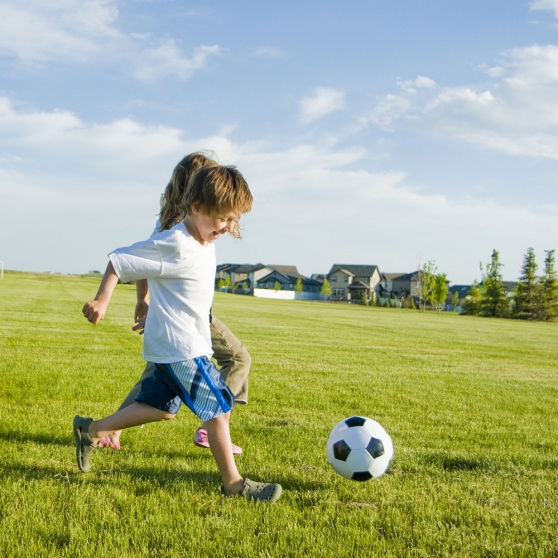Keeping Kids Healthy During the School Year
The health benefits of exercise for your young ones are immeasurable. Exercise controls weight, improves mood, boosts energy, helps your kids fall asleep faster and deeper, lowers the risk of some diseases and is simply a great way to have fun. As a general rule, aim for at least 60 minutes of physical activity every day. Exercise causes the body to produce endorphins — chemicals that can help your child feel more peaceful and happy. Plus, it can give your student a real sense of accomplishment for having achieved a particular goal — like beating an old time in the 100-meter dash.
Reviewed by:
Review Date:
September 4, 2014Citation:
Eat Right, “5 reasons for your teen to eat breakfast” Centers for Disease Control and Prevention, “Handwashing: Clean Hands Saves Lives” Centers for Disease Control and Prevention, “School Starts Soon - Is Your Child Fully Vaccinated?” Kid’s Health, "Tips From School Nurses on Keeping Kids Healthy" Mayo Clinic, "Staying healthy in school: Kid-friendly tips" Let’s Move.gov, "Healthy Families | Let's Move!" Frontiers In Human Neuroscience, "The effects of breakfast on behavior and academic performance in children and adolescents" NPR, "A Better Breakfast Can Boost a Child's Brainpower" John Hopkins School of Public Health, "Why You Should Eat a Healthy Breakfast" National Sleep Foundation, "Children & Sleep" Kid’s Health, "All About Sleep" Mayo Clinic, "Immunizations" Mayo Clinic, "College depression: What parents need to know" AboutOurKids.org, "Beating the Back to School Blues: How parents can help kids calm nerves and start the school year strong" Mayo Clinic, "Exercise: 7 benefits of regular physical activity" Kid’s Health, "Why Exercise Is Wise" Centers for Disease Control and Prevention, "NCHS Data Brief" American Academy of Pediatrics, "Talking With Your Young Child About Sex" Mayo Clinic, "Sex education: Talking to your teen about sex" American Academy of Pediatrics, “Talking With Your Young Child About Sex” Journal of Marriage and Family, “Parental Expertise, Trustworthiness, and Accessibility: Parent-Adolescent Communication and Ado Journal of Adolescence, “Parental communication and youth sexual behaviour.” Courtesy of hortongrou Courtesy of Muriel Lasure | Dreamstime Courtesy of Zurijeta | Dreamstime Courtesy of Grzegorzmoment | Dreamstime Courtesy of Greenland | Dreamstime Courtesy of Monkey Business Images | Dreamstime Courtesy of Wavebreakmedia Ltd | Dreamstime Courtesy of Gvictoria | Dreamstime Courtesy of Nagy-bagoly Ilona | Dreamstime Courtesy of Stephanie Frey | Dreamstime Courtesy of Dreamphoto | Dreamstime Courtesy of Phartisan | Dreamstime Courtesy of Christine Langer-pCourtesy ofschel | Dreamstime
Last Updated:
September 4, 2014
